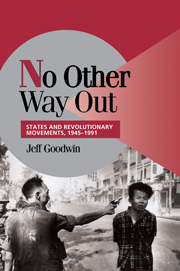
-
Select format
-
- Publisher:
- Cambridge University Press
- Publication date:
- 05 June 2012
- 04 June 2001
- ISBN:
- 9780511812125
- 9780521620697
- 9780521629485
- Dimensions:
- (228 x 152 mm)
- Weight & Pages:
- 0.8kg, 428 Pages
- Dimensions:
- (228 x 152 mm)
- Weight & Pages:
- 0.637kg, 428 Pages
You may already have access via personal or institutional login
Book description
No Other Way Out provides a powerful explanation for the emergence of popular revolutionary movements, and the occurrence of actual revolutions, during the Cold War era. This sweeping study ranges from Southeast Asia in the 1940s and 1950s to Central America in the 1970s and 1980s and Eastern Europe in 1989. Following in the 'state-centered' tradition of Theda Skocpol's States and Social Revolutions and Jack Goldstone's Revolutions and Rebellion in the Early Modern World, Goodwin demonstrates how the actions of specific types of authoritarian regimes unwittingly channeled popular resistance into radical and often violent directions. Revolution became the 'only way out', to use Trotsky's formulation, for the opponents of these intransigent regimes. By comparing the historical trajectories of more than a dozen countries, Goodwin also shows how revolutionaries were sometimes able to create, and not simply exploit, opportunities for seizing state power.
Reviews
‘Jeff Goodwin’s No Other Way Out is an outstanding contribution to the sociology of revolutions. It goes beyond the work of his mentor, Theda Skocpol, and will have a profound impact on the literature for years to come.’
Misagh Parsa - Dartmouth College (Electronic newsletter of the ECPR-SG on Extremism and Democracy)
Contents
Metrics
Altmetric attention score
Full text views
Full text views help Loading metrics...
Loading metrics...
* Views captured on Cambridge Core between #date#. This data will be updated every 24 hours.
Usage data cannot currently be displayed.
Accessibility standard: Unknown
Why this information is here
This section outlines the accessibility features of this content - including support for screen readers, full keyboard navigation and high-contrast display options. This may not be relevant for you.
Accessibility Information
Accessibility compliance for the PDF of this book is currently unknown and may be updated in the future.


